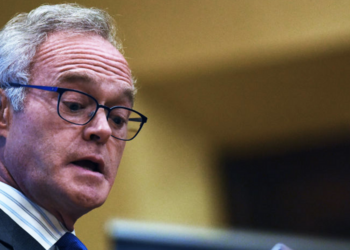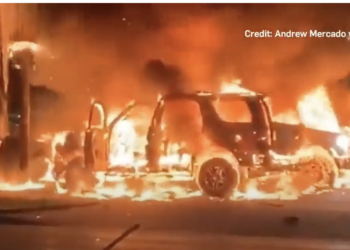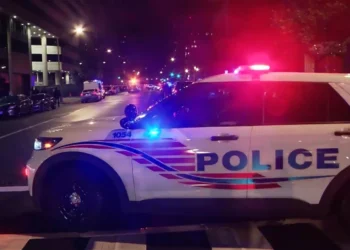But a bipartisan push from both chambers of Congress would instead seek to install FEMA as a Cabinet-level agency, effectively promoting the agency’s importance while moving it directly under Trump’s purview.
The efforts come after Trump has previously floated “reforming” or “getting rid of FEMA.” Homeland Security Secretary Kristi Noem, who oversees the agency, also said during a Cabinet meeting that the agency was “going to eliminate FEMA.”
Congressional lawmakers on both sides of the aisle see a different path forward, however.
Reps. Jared Moscowitz (D-FL) and Bryon Donalds (R-FL) are among the lawmakers pushing to carve FEMA out of the Department of Homeland Security, arguing that the public security agency’s size has become a hindrance.
“Homeland has become too big.” Moscowitz told the Washington Examiner. “It’s a giant bureaucracy, and it’s slowing FEMA down, which is some of the reform and criticism, some of the criticism it gets, and some of the reform that’s needed.”
Donalds, who joined Moscowitz in introducing the FEMA Independence Act earlier this year, said it’s “critical” that FEMA is not caught up in the “bureaucratic mess that Homeland Security can be,” and that there be a direct line between the president and governors in organizing disaster responses.
“It’s just critical at the end of the day when disaster strikes, people need answers quickly, not bureaucratic answers,” Donalds said.
As part of his plans to overhaul the agency, Trump has formed the FEMA Review Council to conduct a “full-scale review” of the agency to suggest “improvements or structural changes.” The council, which met for the first time on May 20, is expected to submit a report of its findings in November.
“The Council will help transform and reform how America responds to and recovers from disasters by recommending changes related to FEMA that best serve the national interest,” White House Spokeswoman Abigail Jackson said in a statement to the Washington Examiner. “Their work will help Make America Safe Again.”
Donalds told the Washington Examiner that he has had conversations with the White House about getting FEMA moved out from under DHS, saying that leaving it within the agency will lead to “more bureaucratic mishaps.”
There is precedent for FEMA to be an independent agency, as it was before the formation of DHS by then-President George W. Bush in the aftermath of the September 11, 2001, terrorist attacks.
Subsequent organizational changes to FEMA following its absorption into DHS alongside over 20 other agencies led its then-director, Michael D. Brown, to warn that the organization would be “fundamentally” severed from its core functions, and that “longstanding, effective and tested relationships with states and first responder stakeholders” would be shattered.
Sen. Thom Tillis (R-NC), the lead Republican author on legislation in the upper chamber to elevate FEMA back to its Cabinet-level status, sees the agency as the heart of disaster management that brings together all levels of government before, during, and after devastating weather events. Portions of his state hit worst by hurricane Helene last September are still recovering from the deadly storm whose wind and rain-induced flooding ultimately killed 107 people in the Tar Heel State.
“This just doesn’t happen organically,” Tillis said. “They are deploying assets. They are working with state agencies before a storm ever hits. They were on the ground when Helene hit. You can’t, all of a sudden, start treating this like a pickup game.”
Eliminating FEMA or having it use federal money to delegate most of its hands-on responsibilities to local governments is a philosophy Tillis emphatically rejected as someone who lacks knowledge of natural disasters.
“I don’t mind FEMA getting thinner. I don’t mind an argument about certain core functions of FEMA being put in emergency management state operations,” he said. “But to eliminate it, to me, demonstrates a lack of understanding of how storm responses work.”
Debate over state vs federal control
At the core of the discussion over reforming the disaster agency is whether or not states or the federal government should be in control of emergency management.
Those in disaster-prone states, such as Sen. Rick Scott (R-FL), hold a pessimistic view of FEMA and are wary of affording it greater power. A former two-term governor of the Sunshine State and no stranger to working with the agency while battling major hurricanes, he characterized FEMA as rife with fraud that does little more than write checks for post-disaster clean-up.
“I think that they actually have way too much involvement. I think some sort of block grants would be helpful,” Scott said. “I’m not a process person, whether it should be a Cabinet or whatever. I think that they are way too involved in disasters. How can somebody in DC know what to do locally? It doesn’t make any sense.”
Rep. Addison McDowell (R-NC) argued that state and local governments should lead on disaster responses, saying that “Bureaucrats in Washington don’t rebuild communities and are too often an impediment.”
“While the federal government should be there to ensure impacted communities have what they need in times of immediate aftermath and also rebuilding, I believe that state and local governments, in partnership with nonprofit and the private sector, should take the lead on implementation and execution,” McDowell wrote in a statement to the Washington Examiner.
Trump himself has stated similar beliefs, saying earlier this year that he would “rather see the states take care of their own problems” during an interview on Fox News.
Rep. Deborah Ross (D-NC) disagrees with eliminating FEMA outright, however, telling the Washington Examiner that doing away with the disaster agency and leaving it to the states would be a “race to the bottom for our people.”
Discussions about altering FEMA in various capacities have also created conservative contrarians willing to cut against the GOP’s traditional narrative that less government is inherently better.
US AND CANADA LINKED UP IN FIGHT TO STOP DRUG SMUGGLING AT BORDER
Sen. Josh Hawley (R-MO), among the chamber’s most conservative members, has begged FEMA to approve Missouri’s pending federal disaster declaration requests from tornadoes that have ravaged the state, some of which have gone unfilled for more than a month. He described FEMA as an agency currently incapable of cutting through bureaucratic red tape to adequately respond to natural disasters but still views it as providing a vital federal service for constituents.
“I’m open to anything that makes sure that in crises like the ones we’re in the midst of in Missouri now, we get the relief we need, our residents get the responsiveness they need,” Hawley said. “What I am not for is something that says, ‘Well, you know, you’re on your own. Good luck to you.’ We paid these tax dollars for a reason.”
















